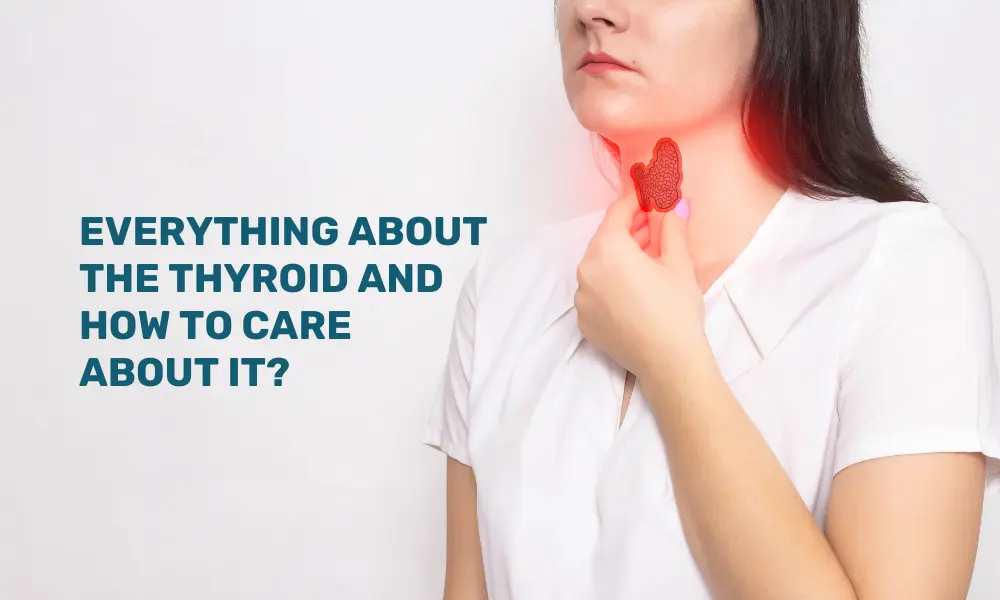The thyroid gland (butterfly-shaped gland) located in our neck is a vital component of our endocrine system. It is important for our metabolism, as the production of a hormone called thyroxine helps our metabolism work efficiently. Generally, when the thyroid gland functions normally, it produces the right amount of thyroxine, which helps maintain a balanced metabolism.
With the increase in thyroid issues, there is a growing concern among people about thyroid-related disorders and thyroid cancers. However, a clear understanding of the basics of thyroid structure, function, and care can help alleviate these fears.
Functions of Thyroid Gland:
The thyroid gland is present in our neck since birth; below are a few important roles it plays in our body:
-
The thyroid gland controls how quickly our body converts food into energy, which is known as your metabolic rate.
-
The thyroid gland can affect how quickly food moves through our digestive tract.
-
The thyroid gland can speed up or slow down your heart rate.
-
The thyroid gland can raise or lower your body temperature.
-
This gland manages skin and bone maintenance by controlling how quickly our body replaces dying cells.
-
It also influences our brain development.
-
It helps control the menstrual cycle in women.
Thyroid disorder:
Thyroid disorders can be categorized into three main conditions.
Hypothyroidism: It generally occurs when the thyroid gland is underactive or does not produce enough thyroxine. Symptoms can include fatigue, weight gain, constipation, dry skin, excessive hair fall, menstrual irregularities, and low mood.
Hyperthyroidism: An overactive thyroid that occurs when the thyroid produces too many hormones. Symptoms can include fatigue, weight loss, sweating, irregular heartbeat, and nervousness.
Other thyroid-related disorders:
-
Thyroid nodules: Lumps or enlarged areas in the thyroid gland
-
Thyroid storm: This condition occurs when there’s a severe excess of thyroid hormone. Symptoms include fever, rapid heart rate, vomiting, and delirium.
-
Goiter: It refers to enlargement of the thyroid gland in the neck.
Further, the thyroid gland sometimes develops small nodules or cysts, which may occur in childhood or as an individual ages. It is essential to note that these nodules are usually not a cause for concern unless there are other signs of abnormalities.
Most of the time, these nodules are harmless and benign and do not pose any health risks. However, they need to be evaluated and addressed based on the clinical and pathological findings.
Identifying and Treatment:
A simple blood test can diagnose hypothyroidism, hyperthyroidism, and thyroid disorders, and treatment typically involves daily intake of thyroxine supplements to normalize the thyroid hormone levels in the patient’s body. In addition to this, below are a few important things one must practice to reduce the chances of developing thyroid disorders.
-
Stick to a diet low in sugar and processed foods, and increase fiber and fresh leafy vegetables in your diet
-
Limit intake of cruciferous vegetables and increase intake of fermented foods.
-
Find ways to reduce your stress. Managing stress is crucial in reducing the chances of thyroid disorders.
-
Exercise three to five times a week and stay active. One must avoid a sedentary lifestyle.
-
One may even practice thyroid-stimulating yoga asanas; it hardly takes ten minutes.
-
Getting enough sleep can also help maintain a healthy thyroid.
-
Regular check-ups can help doctors detect early signs of thyroid disease.
-
Maintain a healthy body weight, as obesity can increase an individual’s chances of developing thyroid disorders.
In a Nutshell:
In today’s internet-based world, it is easy to encounter misinformation about thyroid conditions and treatments. It is, therefore, important to seek advice from healthcare professionals, such as endocrinologists and general physicians, to ensure proper diagnosis and treatment tailored to individual needs.





